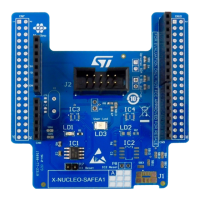Getting started AN4594
4/16 DocID026958 Rev 1
2 Getting started
2.1 Hardware description
This section describes the individual hardware components required for developing a
sensor-based application.
2.1.1 STM32F401RE Nucleo
STM32F401RE Nucleo board belongs to the STM32F401xD/xE range which is based on
the high-performance ARM®Cortex™-M4 32-bit RISC core operating at a frequency of up
to 84 MHz. Its Cortex-M4 core features a single-precision Floating Point Unit (FPU) which
supports all ARM single-precision data-processing instructions and data types. It also
implements a full set of DSP instructions and a memory protection unit (MPU) which
enhances application security. It provides an affordable and flexible way for users to try new
ideas and build prototypes with any STM32 microcontroller lines. The Arduino™
connectivity support and ST Morpho headers make it easy to expand the functionality of the
Nucleo open development platform with a wide range of specialized expansion boards to
choose from. The STM32 Nucleo board does not require any separate probes as it
integrates the ST-LINK/V2-1 debugger/programmer. The STM32 Nucleo board comes with
the comprehensive STM32 HAL software library, together with various packaged software
examples.
The STM32F401RE Nucleo firmware and related documentation are available on st.com at
http://www.st.com/web/en/catalog/mmc/FM141/SC1169/SS1577/LN1810/PF258797
Figure 1. STM32-F4 nucleo board
2.1.2 Sensor expansion board
The X-NUCLEO-IKS01A1 is a sensor expansion board usable with the STM32 Nucleo
system. It is also compatible with the Arduino UNO R3 connector layout, and is designed
around the STMicroelectronics Humidity (HTS221), Pressure (LPS25H) and Motion sensors
(LIS3MDL and LSM6DS0). The X-NUCLEO-IKS01A1 interfaces with the STM32 MCU via
the I
2
C pin, but the user can change the default I
2
C port and the device IRQ by changing
one resistor on the expansion board.

